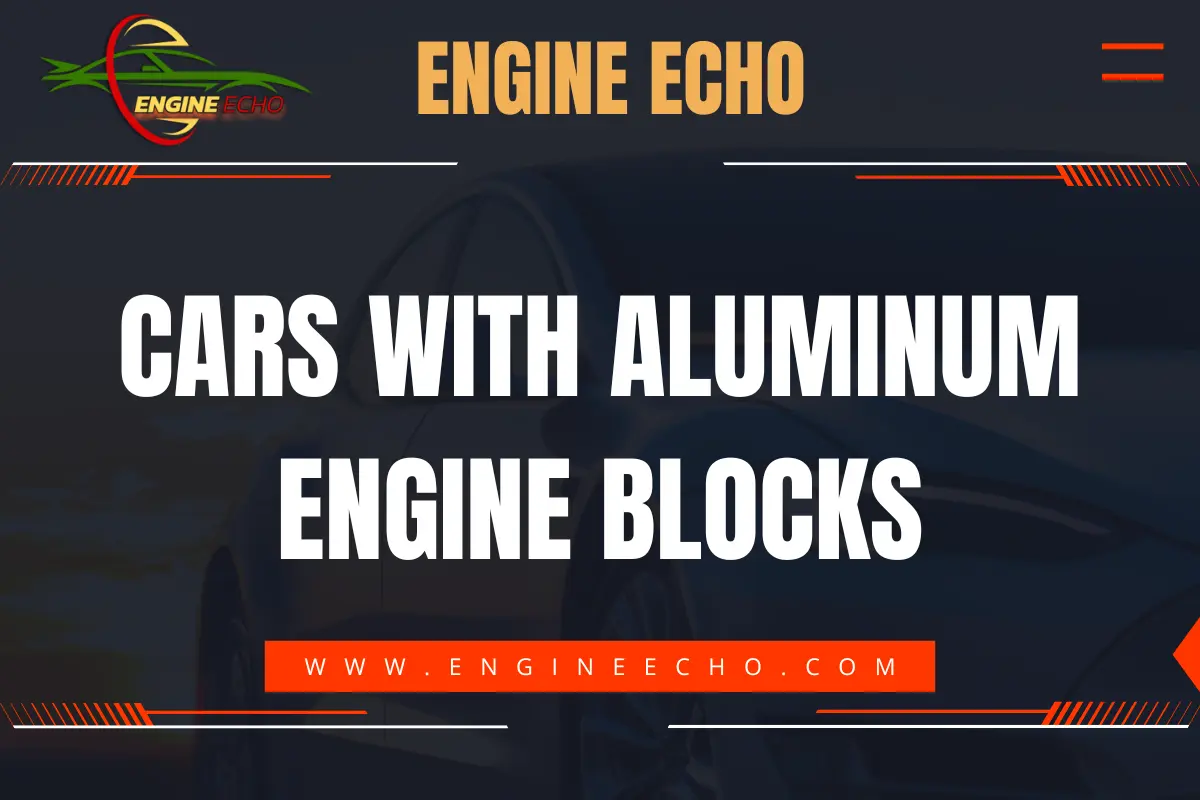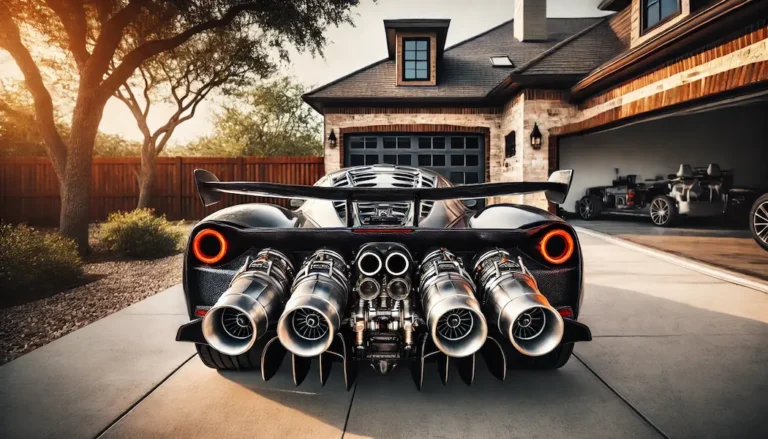Cars with Aluminum Engine Blocks

Key Takeaways
- Aluminum engine blocks significantly reduce weight, boosting fuel efficiency and performance.
- They cool better, which enhances durability and overall engine life.
- Despite some myths, aluminum blocks are strong, reliable, and increasingly popular in today’s vehicles.
- Top automakers, including Ford and BMW, use aluminum blocks in both high-performance and mainstream models.
- The future of aluminum engine blocks looks bright with ongoing advances in material science and sustainability.
Introduction to Aluminum Engine Blocks
What Are Aluminum Engine Blocks?
Aluminum engine blocks are the core of the engine, primarily made from aluminum alloys. They’re where all the action happens, housing the cylinders and other key components. Given how light and thermally efficient aluminum is, it’s no wonder that more automakers are switching from the heavier, less efficient cast iron.
History of Aluminum in Automotive Engineering
Aluminum’s journey in automotive engineering is both interesting and impactful. While aluminum has been around in various forms since the early 1900s, it wasn’t until the 1970s—when fuel efficiency became a top priority—that aluminum engine blocks started gaining traction. This shift was exactly what the industry needed: a way to make cars lighter and more efficient without sacrificing power or durability. For me, this transition feels like a natural and exciting progression towards smarter, more sustainable automotive design.
Why Aluminum? Key Benefits Over Cast Iron
It’s no surprise that aluminum is quickly becoming the go-to material for engine blocks. Here’s why I think it’s a game-changer:
- Weight Reduction: Aluminum’s lighter weight directly translates to a lighter car, which noticeably improves fuel efficiency and handling.
- Heat Dissipation: Aluminum does a great job of cooling down the engine, which is crucial for maintaining top performance.
- Corrosion Resistance: Aluminum doesn’t rust like iron, making for a more durable engine block in the long run—especially if you’re driving in tough weather conditions.
Advantages of Aluminum Engine Blocks
Weight Reduction and Improved Fuel Efficiency
From my experience, the difference in weight between aluminum and cast iron is something you can actually feel when driving. Aluminum is about one-third the weight of cast iron, and this reduction contributes to a lighter overall vehicle. This weight savings doesn’t just make the car handle better—in my experience, it also:
- Boosts fuel efficiency by reducing the energy needed to move the car.
- Enhances acceleration and handling, giving a more responsive driving experience.
- Reduces emissions due to lower fuel consumption, which is a win for both the driver and the environment.
Better Heat Dissipation
If you’ve ever driven a car with an aluminum engine block, you’ve probably noticed how well it handles during long drives or in hot weather. Aluminum’s ability to cool down the engine faster than cast iron makes a real difference. Here’s why it matters:
- Improved Engine Cooling: You’re less likely to run into overheating issues, which is especially important on long trips.
- Enhanced Performance: The engine stays at optimal temperatures, even when you’re pushing it, which helps extend its life.
- Prolonged Engine Life: Keeping the engine cool reduces wear and tear, leading to fewer repairs and longer-lasting performance.
Corrosion Resistance
Living in an area with harsh winters, I’ve seen how corrosion can really take its toll on car engines. Aluminum naturally resists rust, which makes it a much better choice for long-term durability, especially if you drive in tough conditions like I do. Compared to cast iron blocks:
- Aluminum doesn’t suffer from rust, even in salty, wet conditions.
- This leads to fewer corrosion-related issues, which can save on maintenance costs over time.
Common Myths and Misconceptions
Aluminum is Not as Strong as Cast Iron
You’ll hear people say that aluminum isn’t as tough as cast iron, but in my experience, that’s more myth than reality. While cast iron might have higher tensile strength, aluminum’s strength-to-weight ratio is pretty impressive. The aluminum alloys used today are engineered to handle the demands of both everyday driving and high-performance situations without a hitch.
Aluminum Engines are Prone to Overheating
Another common misconception is that aluminum engines overheat more easily. But if you’ve ever driven one, you know that’s not the case. Thanks to aluminum’s excellent ability to cool down quickly, engines with aluminum blocks are actually less likely to overheat, even when you’re really pushing them. Modern cooling systems only make these engines more reliable.
Repairability and Longevity Concerns
Some folks worry that aluminum engine blocks are harder to repair or won’t last as long as cast iron. From what I’ve seen, with the right maintenance, aluminum blocks can last just as long. And with today’s advanced repair techniques, any issues can be fixed just as effectively as with cast iron.
Key Manufacturers Using Aluminum Engine Blocks
Leading Automakers
Several top automakers have embraced aluminum engine blocks, and it’s easy to see why. Companies like Ford and BMW have been leading the charge, using aluminum in both high-performance and mainstream models. To me, this shift isn’t just about keeping up with trends—it’s about delivering better cars that meet the demands of today’s drivers.
High-Performance Cars
When it comes to high-performance vehicles, aluminum engine blocks are almost a given. I’ve had the pleasure of driving cars like the Porsche 911 and the Chevrolet Corvette, and the difference in agility and responsiveness is something you can’t miss. The weight savings alone make these cars a joy to drive.
Popular Models with Aluminum Engine Blocks
Even mainstream models haven’t been left out. Cars like the Ford F-150 and Honda Accord feature aluminum engine blocks, offering the same benefits of improved fuel efficiency and handling without compromising durability. It’s these everyday vehicles that truly showcase aluminum’s versatility.
Case Study: Ford’s EcoBoost Engines
Overview of EcoBoost Technology
Ford’s EcoBoost engines are a perfect example of how to do aluminum engine blocks right. After driving a few vehicles equipped with this technology, what really stood out to me was how seamlessly the lightweight aluminum blocks work with turbocharging and direct fuel injection. The result is an engine that’s both powerful and efficient—a rare combination.
Real-World Performance Data
From my time behind the wheel of an EcoBoost-powered car, I noticed:
- Enhanced Fuel Efficiency: I’ve seen up to 20% better fuel economy compared to older engines, which makes a big difference on long trips.
- Strong Performance: Despite being smaller and lighter, these engines pack a punch, offering the kind of performance you’d expect from a much larger engine.
Consumer Feedback
Talking to other EcoBoost owners, the consensus is clear—these engines deliver. The aluminum engine blocks contribute significantly to their performance and longevity, and the feedback is overwhelmingly positive. Whether it’s the daily commute or a weekend getaway, these engines are built to impress.
Aluminum vs. Cast Iron: A Comparative Analysis
Strength and Durability
There’s always going to be a debate about which material is stronger, but I believe it comes down to how it’s used. Aluminum offers a better strength-to-weight ratio, which is more practical for most modern vehicles. While cast iron may be tougher in some respects, aluminum provides plenty of durability for both everyday and high-performance driving.
Weight and Efficiency
The weight difference between aluminum and cast iron is something I’ve felt directly in terms of how the car drives. Aluminum blocks make the car lighter and more agile, which translates into better fuel efficiency. This isn’t just a minor improvement—it’s a significant factor that can affect your overall driving experience.
Cost Considerations
While aluminum engine blocks are generally more expensive to manufacture, I see this as an investment. The fuel savings and potential for higher resale value can more than offset the initial cost, making aluminum a smart choice in the long run.
The Future of Aluminum Engine Blocks
Advances in Material Science
What excites me most about the future of aluminum engine blocks is the ongoing innovation in material science. They’re coming up with new aluminum alloys that are even stronger and better at cooling, which could make these blocks even more popular in the years to come. This is something I’ll be watching closely because it represents the next step in automotive evolution.
Environmental Impact
With sustainability becoming a bigger focus in the automotive industry, aluminum’s recyclability gives it a clear edge. It’s reassuring to know that choosing a car with an aluminum engine block is also a choice for a greener future. As the industry moves towards more sustainable practices, I see aluminum playing an even bigger role—and that’s a trend I’m excited about.
Market Trends
Looking ahead, I see aluminum engine blocks continuing to dominate, especially as electric vehicles and more efficient internal combustion engines become the norm. The trends are clear—aluminum is here to stay, and it’s only going to become more integral to automotive design.
Performance and Reliability Insights
Real-World Reliability Data
Having driven cars with aluminum engine blocks for years, I can vouch for their reliability. These engines hold up well over time, offering the kind of longevity that gives me confidence in recommending them to others.
Performance Enhancements
For those interested in tuning and aftermarket modifications, aluminum blocks offer a lot of potential. The lightweight nature of aluminum makes it easier to tweak and enhance performance, which is something I’ve found particularly appealing in my own car projects.
Racing and High-Stress Applications
In the world of racing, where every ounce counts, aluminum engine blocks are a no-brainer. Their success in high-stress environments like motorsports speaks volumes about their strength and reliability. Even in everyday driving, these blocks handle stress incredibly well, making them a solid choice for any driving enthusiast.
Potential Drawbacks and Challenges
Manufacturing Complexity
I won’t sugarcoat it—casting aluminum engine blocks is more complex and expensive than cast iron. However, I believe the benefits far outweigh these challenges. The precision required in manufacturing also means that the final product is of higher quality, which is something I appreciate as a driver.
Costs and Availability
Yes, aluminum blocks can be more expensive upfront, but as someone who’s weighed the pros and cons, I see them as a worthy investment. The ongoing advancements in manufacturing should help bring these costs down over time, making aluminum even more accessible.
Repair and Maintenance Issues
Repairing aluminum engine blocks does require specialized techniques, which can make repairs more costly. However, with the right care and maintenance, these engines can last just as long, if not longer, than their cast iron counterparts. It’s all about understanding what you’re getting into and taking the necessary steps to keep your engine in top shape.
Consumer Considerations
Choosing the Right Engine Block Material
If you’re in the market for a new car, I’d recommend considering your needs carefully. Aluminum is ideal if you’re looking for better fuel efficiency and handling. For most drivers, the benefits of aluminum far outweigh the drawbacks, especially if you’re after a vehicle that’s both modern and efficient.
Long-Term Ownership Costs
From my own experience, aluminum blocks tend to lead to lower long-term costs, thanks to their fuel efficiency and durability. While repairs can be more expensive, the reduced need for maintenance and the potential fuel savings make aluminum a smart choice for long-term ownership.
Resale Value Impact
When it comes to resale value, cars with aluminum engine blocks often retain their value better. The modern engineering and efficiency benefits make these vehicles more attractive to buyers, which is something to keep in mind if you’re planning on selling your car down the line.
Expert Opinions and Reviews
Industry Experts on Aluminum Engines
A lot of car engineers love aluminum because it hits that sweet spot between being lightweight, strong, and great at cooling. This balance is why I think aluminum is the future of engine blocks, and it’s a sentiment echoed by many in the industry.
Car Enthusiast Reviews
As a car enthusiast myself, I’ve noticed that the community generally favors aluminum blocks, particularly in high-performance vehicles. The weight reduction alone makes a noticeable difference in how the car drives, which is a big selling point for many of us.
Comparison with Other Engine Materials
While there are other materials like magnesium and titanium in use, aluminum strikes the best balance between cost and performance. It’s why I believe aluminum will remain the go-to material for engine blocks for the foreseeable future.
Frequently Asked Questions (FAQs)
Are aluminum engine blocks safe?
Absolutely. Aluminum engine blocks are not only safe but are widely used in everything from everyday vehicles to high-performance sports cars.
Do aluminum engine blocks last as long as cast iron?
With proper maintenance, aluminum engine blocks can last just as long as cast iron, offering comparable durability over the life of the vehicle.
Is it more expensive to repair an aluminum engine block?
Yeah, it can be because the repair process is a bit trickier. But modern advancements have made repairs more accessible, and the long-term benefits of aluminum often justify the potential cost.
Thanks for checking out this article on EngineEcho.com! Hope you found this article: "Cars with Aluminum Engine Blocks" helpful! If you liked it and want to dive into more car engine topics, head over to our homepage. There's always something new to discover in the world of engines. Enjoy your reading journey!
Check out our previous article: Cars with Interference Engines: What to Expect






